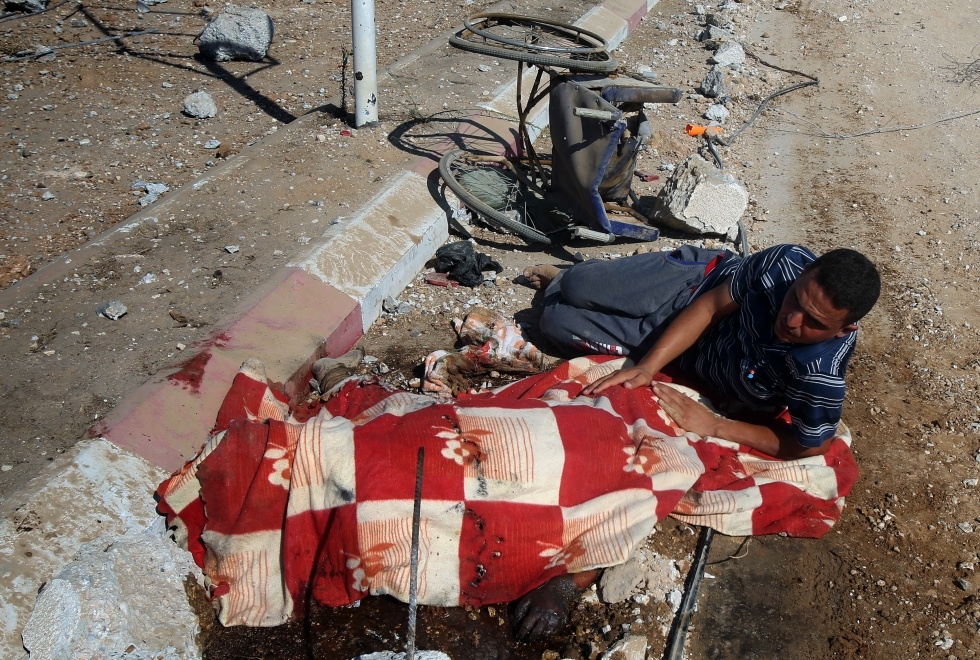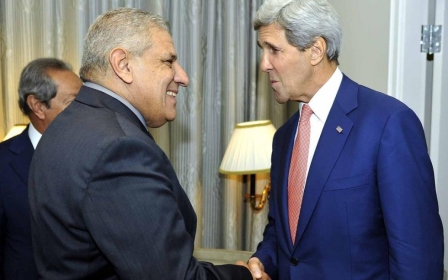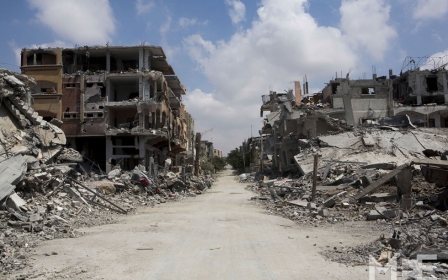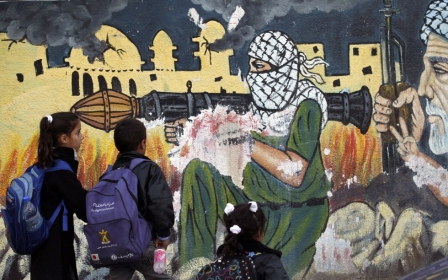Missing in Khuza’a: Dead or arrested?

Fareed al-Najjar, 50, stands at a loss, and does not know which way to turn - his home has been bombed by Israeli tank shells in Khuza’a and he stands lost in the middle of the rubble of his family home.
“It is not about money or assets; all that can be rebuilt. But not knowing about our loved ones is the biggest catastrophe today.”
That feeling of catastrophe is shared by all families in Khuza’a - who sit among the ruins of their bombed-out homes, not knowing if their family members are alive or dead.
“Here are the bodies of 4 elderly men who were killed in front of me. Their bodies were dragged to the side of this gas station.” He described the moment when tank shells began falling on them and snipers were shooting people.
“A donkey cart arrived carrying more dead bodies - the man on the donkey cart could not go further, so he had to put the bodies down here and left them,” he said, while at the other side of him the body of a donkey lay lifeless on the road, covered with what looked like shrapnel wounds.
Fareed is a taxi driver - his orange taxi is smashed underneath the building - but he said nothing about the business that feeds his 9 children. “There is worse that burns my heart,” he said.
His 54 year-old brother Hamdan al-Najjar also doesn’t know what to do next.
He described a moment of death which he and his family had to face - the details of that moment filled with pain and sorrow, as everyone from the area listens to his testimony.
“This is not Khuzaa, the peaceful place where I was born,” says al-Najjar. “Escaping from our homes, we will be hit by Israeli tank shells and snipers, but staying inside means we are still in danger from the bombs overhead,” he explained.
His neighbor, 106 year-old Abu Mustafa al-Najjar, popped his head out of his window, telling Hamdan al-Najjar, “we have never seen a war like this - not even the 1947-48 Nakba.”
The old man’s body was buried after he was killed by an Israeli tank shell. Many in al-Najjar’s family know he is dead, because his body was retrieved and taken away. But many others in the family don’t know yet.
The al-Najjar family knows that 82 of its family members have been killed, either by tank shells or F16 missile strikes; “The explosives the soldiers put under our homes are terrifying… you don’t know which home will be blown up next when soldiers are everywhere,” said a man whose eyes were bloodshot from crying.
Even those who were injured but were rescued from inside their houses had to lay on the side of the road near the gas station, only to be killed later by more Israeli attacks.
“The Israeli soldiers even shoot at anyone who has sustained injuries and is bleeding - some injured people were killed in front of me, while bleeding,” he said, showing stains of blood where Israeli troops told him 17 people had been allowed to leave by Israeli troops to find safe shelter. “But four of them did not make it - they were shot in the head by Israeli snipers,” he explained.
“The soldiers told them that they were safe, but then shot them,” he said.
The 35 years that al-Najjar spent constructing his home is all gone - and he’s never been a resistance fighter or lived near any.
“All my cousins have been taken by Israeli soldiers - we know nothing about them; if they are alive but arrested, or dead under the ruins.”
Al-Najjar and his people have been to the International Committee of the Red Cross (ICRC) to check on their relatives, but little information is provided on the whereabouts of tens of people from his neighborhood. Now they are appealing for more information on those missing. He explains that they also need bulldozers to dig down to see if missing relatives are under ruins of homes.
However, some of those arrested were released after a few days. The terrifying account that 23 year-old Baker told summarizes the story of a man who was forced to strip naked and was beaten up by soldiers.
“The soldiers made two lines, one tank ahead and one behind us, and burning sand beneath our feet,” he told MEE.
Baker said that they interrogated them about tunnels and rockets, of which he knew nothing. For a few days, the soldiers kept him handcuffed, blind-folded and wouldn’t allow him to sleep. He said to them that he is only a farmer and only sees rockets flying in the sky.
Baker said there were more young people, arrested and left behind when he was released with his brother and a few others.
“It all depends on the moods of the soldiers interrogating us,” he added as he gazed at the ruins of his demolished home.
Baker is not familiar with what Hamdan saw, when 15 young men were rounded up from their homes, held inside a bathroom and handcuffed.
“They were executed, shot in the head at point-blank. We found their bodies with arms handcuffed beyond them in a kneeling position on the floor.”
Hamdan said that the Nazis’ led the way in human atrocities, but leading up to 2014, Israel is committing the same atrocities.
The 15 execution victims are known by people in Khuza’a, and their family now knows of their fate. But many more still do not know about their own loved ones.
Hamdan noted that scores of people are missing - in a war-zone area, usually an army announces the names of captured prisoners, but not Israel. They have not made any such announcement during the 4-week war, where so many families remain unsure of the whereabouts of their children and relatives.
“I have lived through 1967, 1982, the Iraq War, 2008, 2012 and now 2014. But this is the most aggressive one - Israel acts as if it’s fighting a powerful equally-sized entity, but we only have the resistance which were not hit, so they arrested, injured and killed our children, all us, the civilians.”
Middle East Eye propose une couverture et une analyse indépendantes et incomparables du Moyen-Orient, de l’Afrique du Nord et d’autres régions du monde. Pour en savoir plus sur la reprise de ce contenu et les frais qui s’appliquent, veuillez remplir ce formulaire [en anglais]. Pour en savoir plus sur MEE, cliquez ici [en anglais].




